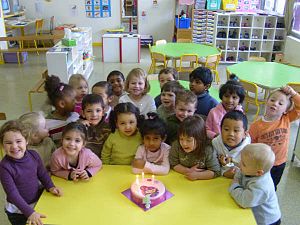After birth, female and male children continue to develop along divergent paths when it comes to their ability to learn science. As Abigail James points out in Teaching the Female Brain
 Image via Wikipedia
Image via WikipediaMoreover, parents, family members and friends socialize children in different ways depending on their sex. Even the most aware parent can unwittingly engage in gender bias when performing the most elemental of acts, such as hugging. Skolnick and colleagues (How to Encourage Girls in Math and Science) reported that mothers started directing boys away from their persons to go exploring at about six months, but continued to worry more about the well-being of their daughters, and kept their girls physically closer longer.
Beyond parents, are the family members and friends who just want to enjoy the new human and are not thinking critically about that chubby-cheeked cherub's chances for mastering astrophysics. Uncle Henry, who tosses baby Freddie in the air, but tickles little Patricia under her cute little chins. Or Aunt Marcia who always brings Patricia a doll and Freddie a truck or tractor.
As a kid, I always wanted the truck. To this day, I remember fondly a two-level gas station, complete with gas pumps and vehicles that a thoughtful relative gave me one Christmas. I also remember the microscope, chemistry set and the circuit board template for making a variety of gizmos, and the very personal gift of my father's own Ham radio Morse Code key and circuitry. Now that was something. Or at least it was until he made me memorize and use the code, and demonstrate proficiency at a certain speed.
The behavior of adults around children can impact a girl's success with science in a number of ways. We know adults can reinforce destructive stereotypes. They also can encourage behavior that may be innate, but is not particularly useful in mastering science. Always praising a daughter for her flowery prose style, and never encouraging her to try a graphic presentation or a chart to make her point is an example of encouraging a child away from skills she needs to develop. Grownups can discourage behavior that would be useful in scientific inquiry, such as exploration and experimentation, deeming it too unladylike or dangerous. Telling a girl to stay clean and not muss her cloths, is the same thing as putting her in a straightjacket when it comes to learning about the natural world.
The professionals (see Science for Girls: Successful Classroom Strategies ) by Susan Gibbs Goetz) say that what unthinking adults are engaged in is the 'dependency training' of girls, and that behaviorists can see the effects of this subversive instruction as early as that first birthday. Girls begin to lose confidence in their ability to do science from the get-go. It may even go beyond loss of self-confidence to the instilling of fear. Fear to try, fear to fail.
) by Susan Gibbs Goetz) say that what unthinking adults are engaged in is the 'dependency training' of girls, and that behaviorists can see the effects of this subversive instruction as early as that first birthday. Girls begin to lose confidence in their ability to do science from the get-go. It may even go beyond loss of self-confidence to the instilling of fear. Fear to try, fear to fail.
What can parents do to combat dependency training? First, knowledge is power. Understanding the developmental paths of boys and girls, and their strengths and weaknesses as it relates to learning, is important in guiding your parental choices and your reactions to a child's behavior. Spend some time on the internet. Some other suggestions follow --
Objective recap: Parents can review at the end of the day or the week, what they have observed in terms of learning behavior. What learning opportunities occurred and how did the child problem solve? Was there an example of analytical thinking? How did the parent or other adult who was present react to the behavior? Was the response constructive? Thing about keeping an activity journal to support this discussion.
In-law management: You have the right to raise your child according to your own rules. Relatives and friends need feedback if they are stereotyping.
Toy inventory: Do an inventory of your daughter's toys. Stand back and assess the hoard as a whole. Make a list of toys that should be acquired, and share it with relatives for gift-giving.
Space assessment: Does your daughter have room to spread out? Project room, not just reading room?
Explorer gear. Does your daughter have clothing that is suitable and safe for active exploring and experimenting? Don't forget the shoes!
When families commit to open up experiences for girls to reach for science, they turn dependency into opportunity.




No comments:
Post a Comment